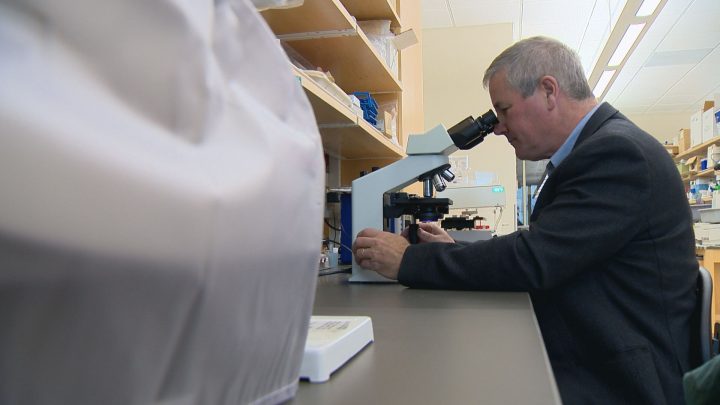For thousands of families, Halloween can be especially scary if their little one has a food allergy.

This is why one mom in 2012 took matters into her own hands to start an initiative aimed at making this time of year less tricky for children with food allergies and find treats that are safe.
READ MORE: Teal pumpkin project helps provide a safe Halloween for kids with food allergies
The “Teal Pumpkin Project” signals to trick-or-treaters like three-year-old Ellie Roth – who has severe food allergies to egg products, peanuts and tree nuts – that a home is handing out non-food items like glow sticks and stickers.
“This is our second year, I didn’t know about it until last year,” Ellie’s mom, Deanna Doherty, said.
“We actually had no kids with food allergies come to the house but the benefit is that the toys and stuff, they don’t go bad, so I just pack them up with my Halloween decorations and they’re good to go next year.”
No one gets left out but perhaps more importantly, said Doherty, each and every child stays safe. More than half of all traditional Halloween candy could cause Ellie to have an allergic reaction, even just one bite.

Get weekly health news
“It would almost be a guaranteed hospital visit,” Doherty said.
“We would have to use her Epipen here at home and … we have to call an ambulance as well and they would go directly to Royal University Hospital where she would be monitored for a minimum of six hours.”
READ MORE: Supporters step up in Markham, Ont. to raise awareness of severe food allergies
Even more peace of mind though could be right around the corner for families living with food allergies. Scientists at the University of Saskatchewan (U of S) say may have discovered a cure after developing a new immunotherapy technique.
“We found that we can reverse allergic disease in animal models asthma and food allergy induced anaphylaxis.”
“It’s quite remarkable actually it is a mouse model and this needs to be translated into humans but it’s the first time I believe that anybody has shown that we can successfully reverse that sensitivity and that lethality of peanut allergies, egg allergies and food allergies in general,” said Dr. John Gordon, the lead scientist behind the more than decade-long discovery.
With Health Canada’s approval, the first human trial could begin within the year.
“One of the problems we have now is all of our treatments for allergy are symptomatic in nature, so they reduce symptoms, they manage symptoms and we can do that very well for many allergies,” Gordon said.
“This is an approach that will actually eliminate the allergy.”
Research that has the potential to impact as many as 2.5 million Canadians with food allergies, including little Ellie.
“If I wasn’t worried about a life-threatening reaction when I’m not there or even when I am there – life would just be way easier,” Doherty said.










Comments